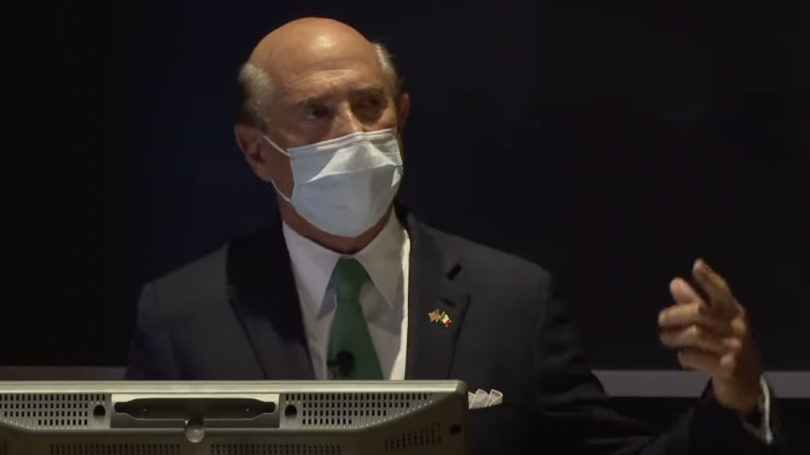
- Public Policy
- Leadership
- Funding
- News & Events
- About the Center
Back to Top Nav
Back to Top Nav
Back to Top Nav
Back to Top Nav
On Monday, September 27th, 2021, Lewis Eisenberg '64, an American financier and investor who served as U.S. Ambassador to Italy and San Marino from 2017 until 2021, convened with Dartmouth students and community members for the Rockefeller Center's second in-person event of the fall term.
Monday's lecture covered Ambassador Eisenberg's decades-long career in business, politics, finance, and diplomacy. At the end of the lecture, Eisenberg fielded questions on subjects such as American and Italian politics, campaign finance, and the COVID-19 pandemic.
Ambassador Eisenberg began by discussing his time at Dartmouth and its influence on him. Eisenberg noted that while he was a student, he was able to meet his wife of more than 50 years, Judy Eisenberg. Further, he assumed leadership roles on campus, chief among them being Eisenberg's time as a member of the Palaeopitus senior society, which provided him with an opportunity to work on behalf of students and with mentors such as Dean Thaddeus Seymour.
Eisenberg also got his first exposure to politics at Dartmouth, meeting on multiple occasions with then-New York Governor Nelson A. Rockefeller while a member of Palaeopitus. Likewise, Eisenberg canvassed for Barry Goldwater in 1964 with his fraternity brother Herbert McChord. He did so primarily at Herbert's behest: "I wasn't sure who Goldwater was, or what Goldwater meant," Eisenberg observed. As for the campus response to their political agitation, Eisenberg wryly observed that the attacks "were not nice, and there were many."
After graduating from Dartmouth, Eisenberg earned an MBA at Cornell before working at Goldman Sachs, where he became a partner. Upon leaving Goldman, Eisenberg founded Granite Capital with the help of many of his Dartmouth friends. Herbert McChord, who by that point had become a well-recognized radio figure, joined Granite and to help Eisenberg accumulate 11 radio stations across the country—a profitable addition to Eisenberg's prior commercial successes.
In tandem with Eisenberg's private success, he had assumed increasingly large roles in public service. Importantly, in the late 1990s Eisenberg was named Chairman of the New York and New Jersey Port Authority, which "runs the railroad from New Jersey to New York, operated the World Trade Center, and had 1,700 police officers… the only force that could serve two states." Visibly moved, Eisenberg then discussed his experiences during the 9/11 attacks, which killed 84 Port Authority employees. He attended the funeral of every Port employee killed.
9/11 was a formative moment for Eisenberg: "I wanted to do something for my family, my children, and Americans…" Subsequently, Eisenberg became finance chairman of the Republican Party for three presidential candidates, working on behalf of a party that he saw as best aligned with his desire for a "fiscally conservative, socially inclusive, no litmus test, strong foreign policy, strong military" government.
Eisenberg served as the Finance Chairman of the Republican Party during President Trump's successful election campaign in 2017. Describing President Trump as more of an acquaintance than a friend, Eisenberg was surprised to receive a phone call from the President one Sunday morning informing him that he had been nominated to be U.S. Ambassador to Italy.
"I thought I was too old to take four years of my life and dedicate it to service abroad," Eisenberg said. But upon further reflection, he accepted the position, serving a four-year term that encompassed the tenures of three Italian Prime Ministers, major geostrategic shifts in Europe, and, of course, much of the COVID-19 pandemic.
During questions, Eisenberg offered his opinions on current affairs, noting that "I firmly believe we are in the most difficult spot that we've been in over the past 20 years." Continuing, he said, "I cannot remember a time when democracy as we know it and the freedoms that we enjoy have been more at risk than they are today. We have the extremes of the right on one side, the extremes of the left on the other side, and our adversaries, particularly China, have never been greater." Moving onto the COVID pandemic, Eisenberg emphasized that the virus's early spread in Italy during his Ambassadorship greatly strained the Italian government and wreaked havoc on State Department deployments throughout the country. "It was an incredibly awful time for everyone around the world," he emphasized. Finally, when asked to discuss campaign finance reform, Eisenberg said that "I think things have to change. I'm not sure what the changes should be, but [the campaign finance] system is not working very well right now."
Back in the United States and reflecting on his experiences, Eisenberg offered the following advice for the Dartmouth community: "You all have Dartmouth in your blood with the friends you've made and the friends you keep. Work hard, get involved, and work for your country."
Written by Ben Vagle '22, Rockefeller Center Student Assistant for Public Programs